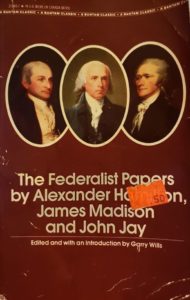
As we deal with impeachment of the president in 2019, we have few precedents to base a position on. Impeachment has happened only twice, and would have occurred one other time had not the president resigned.
What is an impeachable offense? What was on the Founders’ minds at the Constitutional Convention? How would they approach it today? The place I always turn first on Constitutional issues is the Federalist Papers. What did Madison, Hamilton, and Jay have to say concerning this?
A well-constituted court for the trial of impeachments is an object not more to be desired than difficult to be obtained in a government wholly elective. The subjects of its jurisdiction are those offenses which proceed from the misconduct of public men, or, in other words, from the abuse or violation of some public trust. They are of a nature which may with peculiar propriety be denominated political, as they relate chiefly to injuries done immediately to the society itself. The prosecution of them, for this reason, will seldom fail to agitate the passions of the whole community, and to divide it into parties more or less friendly or inimical to the accused. In many cases it will connect itself with the pre-existing factions, and will enlist all their animosities, partialities, influence, and interest on one side or on the other; and in such cases there will always be the greatest danger that the decision will be regulated more by the comparative strength of parties, than by the real demonstrations of innocence or guilt.
The delicacy and magnitude of a trust which so deeply concerns the political reputation and existence of every man engaged in the administration of public affairs, speak for themselves. The difficulty of placing it rightly, in a government resting entirely on the basis of periodical elections, will as readily be perceived, when it is considered that the most conspicuous characters in it will, from that circumstance, be too often the leaders or the tools of the most cunning or the most numerous faction, and on this account, can hardly be expected to possess the requisite neutrality towards those whose conduct may be the subject of scrutiny.
Federalist #65, by Alexander Hamilton
I don’t find this particularly helpful. Or, rather, it’s helpful, but not very comprehensive. Impeachment is a political process. Because the president is immune from being charged criminally while president, so that he/she wouldn’t be continuously harassed in office, impeachment by the House, trial by the Senate—resulting either in acquittal or conviction, resulting in removal from office, and then charging and trial by the courts. That’s the process, but for what can the president be impeached? I just went through the entire Federalist Papers, searching for “impeach” and other related terms. I’m surprised at how little is included. They include much discussion of why the Senate is the right body for impeachment trials. But, as far as discussions on what is and what is not an impeachable offense, I find very little, except what I’ve quoted above from Federalist #65.
An additional source is James Madison’s notes on the Constitutional Convention. I just went through those notes, looking for discussion on what is impeachable, and I found this.
The clause referring to the Senate, the trial of impeachments agst. the President, for Treason & bribery, was taken up. Col. MASON. Why is the provision restrained to Treason & bribery only? Treason as defined in the Constitution will not reach many great and dangerous offences. Hastings is not guilty of Treason. Attempts to subvert the Constitution may not be Treason as above defined. As bills of attainder which have saved the British Constitution are forbidden, it is the more necessary to extend: the power of impeachments. He movd. to add after “bribery” “or maladministration.”
Mr. GERRY seconded him.
Mr. MADISON So vague a term will be equivalent to a tenure during pleasure of the Senate.
Mr. Govr. MORRIS, it will not be put in force & can do no harm. An election of every four years will prevent maladministration.
Col. MASON withdrew “maladministration” & substitutes “other high crimes & misdemeanors agst. the State”
On the question thus altered
N. H. ay. Mas. ay. Ct. ay. N. J. no. Pa. no. Del. no. Md. ay. Va. ay. N. C. ay. S. C. ay. Geo. ay.
James Madison, Notes on the Constitutional Convention, for September 8, 1787
This gives us a little more to go on. The original clause on impeachment was for treason and bribery. Mason of Virginia wanted to add “maladministration” as a reason for impeachment. What, exactly, is maladministration? I interpret it to mean “doing a bad job” or “not doing a good job”. In other words, incompetence or malfeasance.
The summary of the debate, somewhat spare in Madison’s words, was that maladministration would never in fact be used as a reason for impeachment, and the correction for maladministration is elections.
Facing rejection of his motion, Mason changed the motion to add “other high crimes & misdemeanors”. In other words, for crimes other than treason and bribery. This seems to me to be more or less the same as felonies and misdemeanors—things that would result in being charged in criminal court if not the president.
Others think the word “high” applies to both crimes and misdemeanors. If that were the case, the bar would be a little different than my interpretation.
The question now comes down to whether the impeachment of the current president meets the constitutional definition. Alas, I’ve already exceeded a reasonable word limit for a blog post, and will have to answer that in a future post. I may post earlier than my normal schedule.